- Home
- Simon Beckett
The Restless Dead Page 6
The Restless Dead Read online
Page 6
With a last glance at the empty road, I went back to my car. There was no serious damage, although the hawthorn branches scraped across the bodywork as I eased out of the hedgerow. I gritted my teeth at the sound, trying not to think about the paintwork.
I checked the dashboard clock as I pulled away. There was still time to get to the briefing, but I couldn’t afford any more delays. My headache had grown worse, not helped by the jolting from the emergency stop. Opening my window for fresh air, I kept my speed down in case the ragged man had decided to stop on another blind bend. But there was no sign of him around the next, or the one after that. I began to relax, thinking he’d cut across one of the fields, and then I rounded another bend and saw him.
Walking down the middle of the road, right in front of me.
Oh, for crying out loud … Slowing, I drew up behind him. He didn’t turn around or show any sign of getting out of the way. Just carried on walking at the same pace, arms cradling the seagull to his chest. My hand went instinctively to the horn, but I didn’t press it. He was obviously in a fragile state, and I didn’t want to frighten him.
Instead, with the car crawling along behind him, I wound the window the rest of the way down and called out.
‘Do you want a lift?’
Providing he didn’t live too far away I should have enough, time to drop him off. That would get him out of the way and ease my conscience at the same time. Very principled, a small voice mocked. I silenced it by telling myself that I could always contact social services later. Right now there was somewhere I needed to be.
But the man walking in front of the car gave no response. Wondering if he might be deaf, I called again. This time a slight sideways jerk of his head said he’d heard me.
He just wasn’t taking any notice.
Despite myself, I could feel my frustration growing. I tried a different tack. ‘Can you let me pass?’ I shouted.
Again, there was no response. I looked at the gap between him and the hedgerow, wondering if I could squeeze by, before abandoning the idea. The road was too narrow, and trying to push past a pedestrian with a car was never going to end well.
My car rumbled along in first gear behind the gangling figure in the filthy raincoat. He continued plodding along the road, still carrying the seagull. I considered getting out of the car and trying to persuade him to move, but I knew that would be asking for trouble. Although I’d only been a GP, not a psychiatrist, it was clear the man had problems. There was no telling how he’d react if he felt threatened, and I could already see signs that he was distressed. He’d started walking faster, his head twitching to the side as he cast glances over his shoulder. Whatever else might be wrong with him, he was vulnerable and scared, and right now I wasn’t helping.
With a sigh, I dropped back, letting the car coast almost to a stop so he could pull ahead. So now what? I gnawed my lip, feeling clammy and out of sorts as I fretted over the lost time. For all I knew he might carry on like this for miles, and wouldn’t that make a fine excuse when I showed up late for the briefing?
Or missed it altogether. The satnav had finally sorted itself out, the GPS kicking in to establish where I was. Lundy had warned against relying on it out here but I didn’t need an alternative route. Only a detour so I could get past the man in front of me. There was a turning coming up that seemed to connect back to this road after a mile or so. It would take me right into the saltmarshes of the Backwaters, but only for a short while. One thing was certain: if I didn’t do something I was going to be late.
The road ahead was clear. I set off again, watching the on-screen arrow marking my position draw closer to the turn-off. There was no sign of the walking man. I wondered again who he might be, what his story was. And why was he carrying a bloody seagull?
I almost missed the turning. It was little more than a gap in the tall hawthorn hedgerow, a single lane track that cut off at a right angle. Hoping I didn’t meet another car, I set off down it. The tarmac was broken and overgrown with weeds and grasses, except for two parallel ruts made by previous vehicles. The tall hedgerows funnelled me along, keeping me from seeing where I was going. I was forced to trust the satnav’s map, which showed a T-junction with another road coming up. All I had to do was turn on to it and follow it for about a mile, then I’d be able to cut back on to the route I’d just left. There was still enough time to make the briefing, I told myself, and then the hedgerows ended and I saw what lay ahead.
The road ran into a river.
A broad swathe of water lay in my path, cutting me off from the road on the far side. Not a river, I realized, a tidal creek. It must feed into the estuary, and now it was being flooded by the returning tide as well. It was taking longer this far inland, but water already covered most of the muddy creek bed. The road promised by the satnav was no more than a thin causeway, a rough finger of built-up shingle. Crossing it wouldn’t be a problem at low tide, but sections of it were already submerged and the rest soon would be.
I swore and stopped the car. There was no room to turn around, and I didn’t relish trying to reverse all the way back up the winding lane. I told myself to stay calm as I stared at the rapidly flooding causeway. The creek wasn’t very wide here, and over on its far side I could see the T-junction with the road I’d intended to take. It was agonizingly close. The water covering the causeway was still shallow, and I couldn’t see that it would be any different from driving along a flooded road. But it wouldn’t stay like that for long; if I was going to cross I’d have to go now.
So what’s it to be? Go or stay here? There wasn’t really any decision to make. Putting the car into gear, I drove down on to the causeway.
Shingle crunched under the tyres, then was muted by the hiss of spray. I kept my speed slow but steady, not taking my eyes off the barely visible strip in front of me. In places it disappeared altogether, and I had to keep the car straight and trust there were no bends. My knuckles whitened on the steering wheel as water sluiced up on either side like a bow wave. But the opposite bank was drawing closer, and as I passed halfway I allowed myself to relax. Almost there, I thought, and then the car jerked as a front wheel dropped into a submerged pothole.
It wasn’t very big, but it didn’t have to be. The car’s front end dipped down, slapping deeper into the water, and as quickly as that the engine cut out.
‘No!’ I said, hurriedly reaching to restart it. ‘No, no, no …’
The engine wheezed for long enough to give me hope, then died. I turned the key again, holding it as tight as I could as though that would make any difference.
‘Come on …!’
The engine whined before dying once more. I tried it again, and then again, but there wasn’t even a murmur. I sat in the sudden silence, stunned by this new disaster. The far bank couldn’t be more than a few car lengths away. I stared at it, and then flung open the car door and jumped out. The water was bitingly cold and came almost to my knees. It poured over the sill, soaking through my boots and trousers. The pull of it surprised me, and I recalled Lundy telling me the tide came in faster than a man could run.
Not that I was running anywhere. The driver’s window was still open, so I quickly closed the door on the water and reached inside to steer with one hand. Then, putting my shoulder into it, I began to push. The car shifted forward and then stopped. The wheel was still stuck in the pothole. Swearing, I dug my feet into the shingle and heaved against the car. Again, the wheel caught on the pothole, but this time I’d been expecting it. As the car rolled back I heaved again, using its own momentum to bump it free.
Yes! Sluggishly, the car began to move forward. I kept pushing, water sloshing up to my knees as I struggled to keep it going. The causeway was becoming difficult to see as the tide covered more and more of it, but I kept the bonnet aimed at where it emerged on to the far bank. The water tugged at my legs as the rising water flowed past. It was becoming harder to push the car as it deepened, but every yard I managed was that much closer to dry land.
I was getting into a rhythm when the car suddenly lurched to a halt. I clutched on to it as I lost my balance, realizing straight away what had happened. The back wheel had caught in the same pothole.
‘Don’t do this,’ I breathed, trying to rock the car free again.
This time I wasn’t so lucky. I strained against the car, my feet skidding and sinking into the shingle, but it didn’t budge. Gasping, I abandoned the attempt. The car wasn’t going anywhere unless I could clear away some of the shingle. By now I was soaked to my thighs. Taking off my coat, I put it on the roof and pushed back my sleeves before reaching into the freezing water, groping for the hole the wheel had sunk into. Sharp stones and shells scratched at my hands, cutting into my bloodless fingers as I tried to scrabble them away.
It was a waste of time: the wheel was too firmly held. I banged the side of the car in frustration, trying to think of something in the boot I could use to dig with. The lid from the cool-box would make a poor shovel, but it was better than bare hands. Hugging the side of the car so as not to slip off the causeway, I splashed around to the back. But even as I did I knew it was no use. The water was rising too quickly. It was already so deep that I wasn’t sure I’d even be able to push the car through it. It wouldn’t be safe to stay out here much longer.
I wasn’t ready to give up just yet, though. The water hadn’t quite reached the boot. I opened it up, ignoring the bin bag containing the waders that I didn’t have time to put on, and pulled the cool-box towards me. I was about to take the lid off when I heard a noise. Faint, but unmistakable: the sound of an engine. Looking out from behind the boot, I saw a flash of grey streaking behind the hedgerow that ran along the creekside road.
A car was coming.
6
I COULDN’T SEE it clearly through the bushes but it was travelling fast. Water sloshed around my knees as I hurried to the front of my car. As the deep growl of a diesel engine grew louder, I frantically began waving.
‘Hey! Over here!’
The car was close enough now to see it was some kind of 4x4. There was no way it could miss me: the road would take it within a stone’s throw of where I was stranded. It was a Land Rover, a gunmetal-grey Defender, and as it drew nearer I saw a face inside turn my way. The car slowed.
Then it speeded up and carried on.
‘No! What’re you doing?’
I stared after the Land Rover in disbelief as it continued down the road. How the hell could the driver not have seen me? Then, just when I thought it was going to keep on going, it pulled up. For a few seconds it just sat there with its engine running, until with a rising whine it quickly reversed up the road. It went past the track leading down to the causeway, but only far enough so it could turn into it facing the creek. Then it bumped down the track and drove straight into the water. Spray shot up as it ploughed towards me, stopping a few yards away. Its engine chugged, exhaust venting from a vertical pipe by the cabin. A snorkel, I realized as the wind whipped the fumes away.
The door opened and a man jumped out into the creek. Indifferent to the water that darkened his jeans to the knees, he waded round to the back of the Land Rover and opened the rear door. Reaching inside, he took something out before returning to the front.
‘Here.’
He threw a length of coiled-up rope to me, holding on to one end so it unravelled in the air. It slapped into the water a few feet away. I hurried to grab it as it began to sink and turned back to my car. Reaching into the cold water, I felt for the tow point under the bumper and tied the rope as best I could. By the time I straightened the man had already secured his end of the rope to the Defender’s half-submerged tow hitch.
‘Make sure you stay on the causeway when I start to back up,’ he shouted. ‘If you go off the edge I won’t be able to pull you out.’
I looked at the rippling water; the pale strip of shingle underneath had all but vanished. ‘I can’t see it.’
‘Just aim for me. I’ll flash my lights before I start.’
He turned away and climbed back into the Land Rover. I reached through my car’s open window and took hold of the steering wheel. It would have been easier to steer from the driver’s seat, but if I opened the door now the inside of the car would be flooded.
The Land Rover’s engine suddenly revved and its lights flashed twice. The rope came out of the water as it took up the slack, shedding droplets as it snapped taut. For a second nothing happened. Then the rope quivered and with a lurch my car started moving. I kept my eyes fixed on the Land Rover as it reversed slowly out of the creek. My hands hurt from gripping the steering wheel as the 4x4 backed up on to the bank.
And then my car was bumping up on to the track and off the causeway. The Land Rover carried on going, towing me well clear before it stopped. Water streamed from the car, and when I opened the door the footwells were a sodden mess. But the door seals had kept out the worst of it, and the seats were dry. I looked back at the flooded creek bed. The water completely covered it now, with no sign whatsoever of the causeway.
I turned at the sound of the Land Rover’s door slamming. The man looked in his mid to late forties, the unkempt dark hair shot through with the same grey that stubbled his chin. There were deep lines running from his nose to the corners of his mouth, and the creases on the broad forehead suggested a disposition more inclined to scowl than smile. He wore thick-framed but stylish glasses and a brown leather jacket over a navy sweater and jeans. All were well worn, but the jacket looked expensive, and I noticed the discreet designer logo on the side of the glasses.
I held out my hand. ‘Thanks. I thought I was—’
‘What the hell were you doing?’
His vehemence took me aback. I lowered my hand, my face beginning to burn. ‘The satnav showed this as a detour. There was somebody in the—’
‘Are you blind or just stupid? See all that wet stuff? That’s water. You don’t try driving across a causeway when the bloody tide’s in!’
‘The tide wasn’t in, and if I’d known there was a pothole I wouldn’t have tried to cross. But I appreciate your help.’
I kept my own voice calm with an effort. I didn’t need anyone telling me I’d been stupid, and even though I was in his debt I wasn’t going to be yelled at by a complete stranger. And not one who’d clearly thought long and hard before deciding to come back.
He glared at me, and I could almost feel the desire to argue radiating from him. I couldn’t believe it was just because he’d had to pull my car out of the creek. But I was aching, soaking wet and terminally late for the pathologist’s briefing. Whatever his problem was, right then I didn’t care. I stared levelly back at him, holding my own temper in check.
After a moment he looked away, breathing out as though audibly letting go of something. ‘What are you doing here anyway? We don’t get many people coming this far out.’
I hesitated. But by now Sir Stephen Villiers’ driver wouldn’t be the only person who knew a body had been found. And if this man was local he could hardly have missed the police helicopter that had been circling since first light.
‘I was here for a police operation,’ I said after a moment.
His gaze suddenly became more piercing. ‘You mean the body? You’re a police officer?’
Here we go again. My headache had never gone away, but now I became aware of its dull throbbing again. ‘No, I’m not a police officer. And I’m not going to tell you what I’ve been doing, so there’s no point asking.’
It came out sharper than I intended. Now it was his turn to look taken aback. ‘Well, that’s honest, at least. What are you, some sort of police consultant? Or can’t I ask that either?’
That much was hardly a secret. ‘I’m a forensic anthropologist.’
It wasn’t giving much away but he nodded, apparently satisfied. ‘Sorry for taking your head off. I’m Andrew Trask.’
He said it as though it should mean something. It didn’t, and I was too on edge to pay much attention. I shook the offered
hand. ‘David. David Hunter.’
A gust of wind suddenly made me realize how cold and wet I was. It belatedly occurred to me that Trask wasn’t much better. Water pooled round his boots, and the denim of his jeans was darkened up to the knee as he looked past me at my car. I could almost see some sort of internal debate going on.
‘You’re not going to be able to call a recovery service.’
‘I’ve got breakdown cover,’ I told him, misunderstanding. This wasn’t the first isolated place my work had called me out to, so I’d made sure I wouldn’t be stranded if I broke down.
‘No, I meant you won’t get a phone signal. Reception’s patchy out here.’ He paused, and again I got the impression of a decision being made. ‘I’ll give you a tow to my house. It’s not too far and you can make the call from there.
‘That’d be great. Thanks,’ I said, surprised by the offer after his earlier hostility.
But I wasn’t about to refuse. I’d need all the help I could get if I was going to even make the post-mortem itself, never mind the briefing.
He shrugged, looking as though he were already having second thoughts. ‘I can’t leave you out here. It’ll be easier for directions and my son’s good with engines. He might be able to help.’
‘No, that’s OK. I’m putting you to enough trouble already.’
That was true enough, but I didn’t want an amateur mechanic making things worse, no matter how well intentioned.
Trask gave me an odd look. ‘Hardly matters, does it?’
At another time I would have wondered what he meant, but I was too tired and dispirited to give it much thought. Some of the energy seemed to drain out of him as he looked down the creek, then he straightened.
‘Come on, let’s get back,’ he said.
While Trask turned the Land Rover around so the rope could be retied to the rear tow bar, I tried my phone. As well as the recovery service, I needed to call Lundy to let him know I’d be late. I’d no idea what damage the salt water would have done to my car, or how long it would take to repair. But if I had to I’d leave it here and worry about that later. My priority now was getting to the mortuary.

 Where There's Smoke
Where There's Smoke The Chemistry of Death
The Chemistry of Death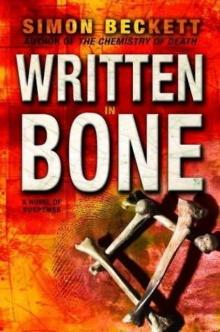 Written in Bone
Written in Bone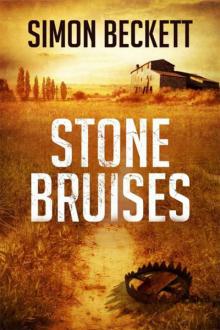 Stone Bruises
Stone Bruises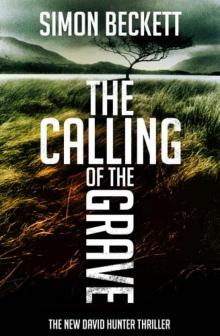 The Calling of the Grave
The Calling of the Grave Whispers of the Dead
Whispers of the Dead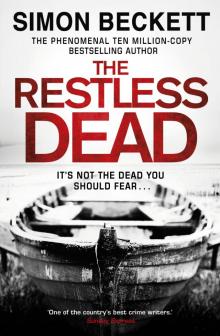 The Restless Dead
The Restless Dead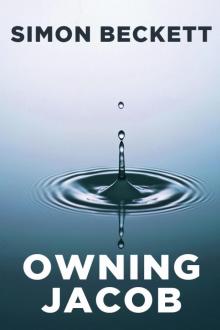 Owning Jacob
Owning Jacob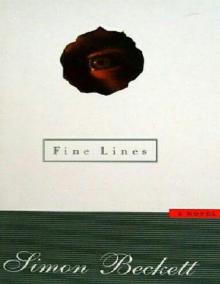 Fine Lines
Fine Lines Whispers of the Dead dh-3
Whispers of the Dead dh-3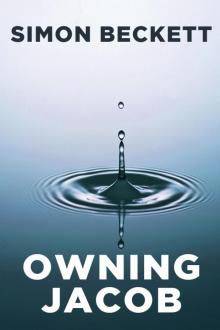 Owning Jacob (1998)
Owning Jacob (1998)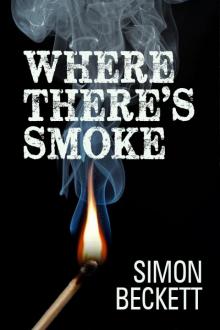 Where There's Smoke (1997)
Where There's Smoke (1997)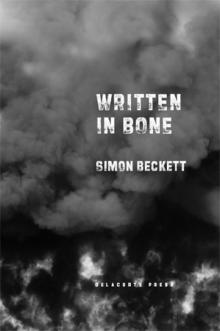 Written in Bone dh-2
Written in Bone dh-2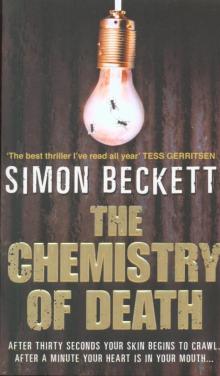 The Chemistry of Death dh-1
The Chemistry of Death dh-1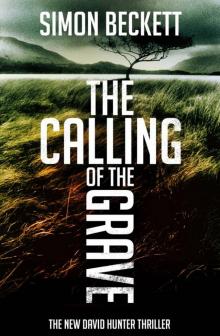 The Calling Of The Grave dh-4
The Calling Of The Grave dh-4